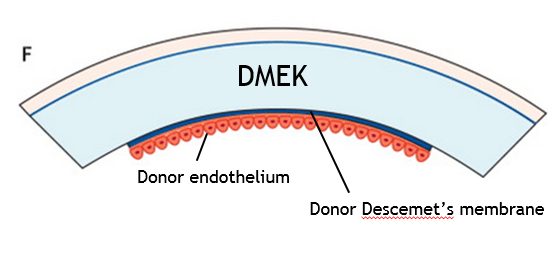Table of Contents
Who Is Corneal Transplant Surgery For?
Over 40,000 people undergo a cornea transplant in the United States each year. Corneal transplant surgery is recommended for people who have:
- Vision problems are caused by thinning of the cornea, most often due to keratoconus. A cornea transplant may be considered when less invasive treatments are not an option.
- Scarring of the cornea from severe infections or injuries
- Vision loss is caused by cloudiness of the cornea, most often due to Fuchs’ dystrophy
During these procedures, damaged tissue on the eye’s clear surface – the cornea – is replaced.
Replacing The Cornea
As the front, clear layer of the eye, corneas are a unique part of the body and feature five layers (from front to back); Corneal epithelium, Bowman’s layer, Corneal stroma, Descemet’s membrane, and Corneal endothelium. Problems with any of these layers can cause blurred vision, glare, and distortion.


This was a vast improvement as the top two layers of the cornea were undisturbed. Now we have Descemet Membrane Endothelial Keratoplasty (DMEK). DMEK is not only changing the way cornea transplants are performed, but also improving the results. With this procedure, only the innermost layers are replaced. Removing fewer layers means a more pure replacement.
The DMEK procedure targets patients whose inner endothelial cell layer is diminished and the stroma is becoming waterlogged. The cornea’s transparency is dependent on its inner cells’ ability to pump fluids – and when it fails, it swells and results in cloudy eyes.
Before DMEK, Descemet’s Stripping Automated Endothelial Keratoplasty (DSAEK) was the most common transplant procedure.
Three Advantages of DMEK over DSAEK Corneal Transplant Surgery
Improved Vision
Greater portions of DMEK patients are attaining 20/20 vision or better following the procedure compared to DSAEK.
Improved Visual Recovery
While a patient’s vision is a bit fuzzy following the procedure, as the days progress it improves. For DMEK, the visual recovery path is much faster, taking only weeks instead of months. Patients are able to resume normal activities more quickly as well, as most are back to their regular activities within a week.
Reduced Risk of Rejection
When replacing the entire cornea, there is a risk of rejection. In procedures where all five layers are removed, rejection occurs in about 20% of the transplants. With DMEK, that risk is reduced to 1-2%.
The DMEK procedure takes about 30 to 40 minutes, a slightly longer procedure than DSAEK. However, the process is still being mastered, so it’ll likely soon become a shorter procedure. During the procedure, the patient is administered anesthesia and the diseased innermost layer of the cornea is carefully removed. Then, the healthy donor cornea is inserted and held in place by an air bubble, which goes away within the first week.
Specialty Eye Institute is proud to offer this procedure. It’s a procedure that requires a commitment from our entire team – from the staff to the eye doctors. Many eye surgeons in the state still aren’t performing this technique because of the steep learning curve and required training. Contact SEI today to learn more about corneal transplant surgery!
 877-852-8463
877-852-8463






























